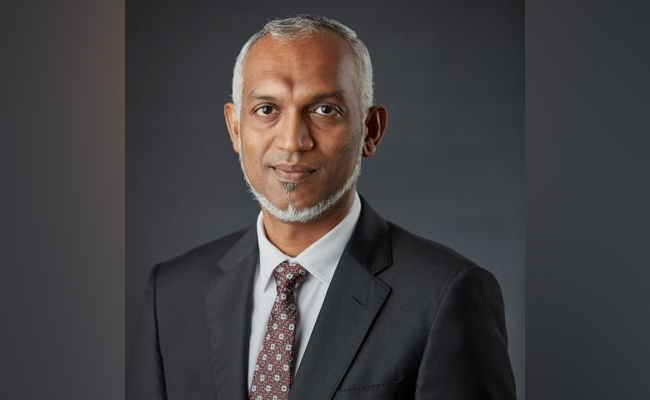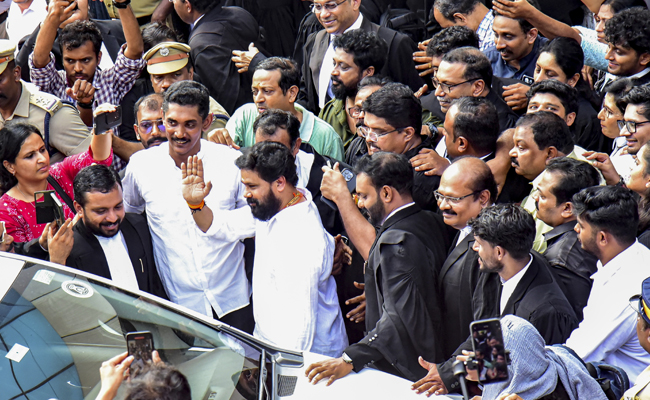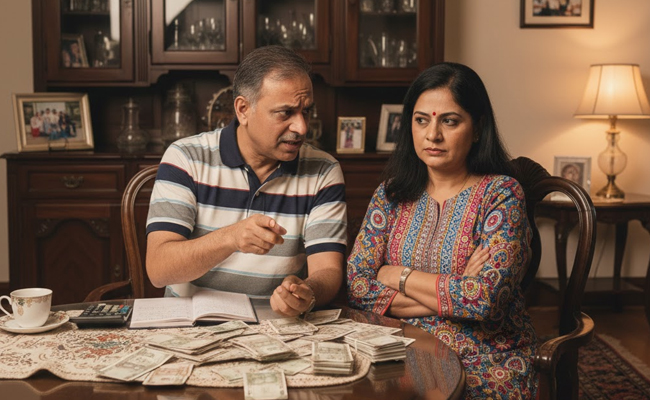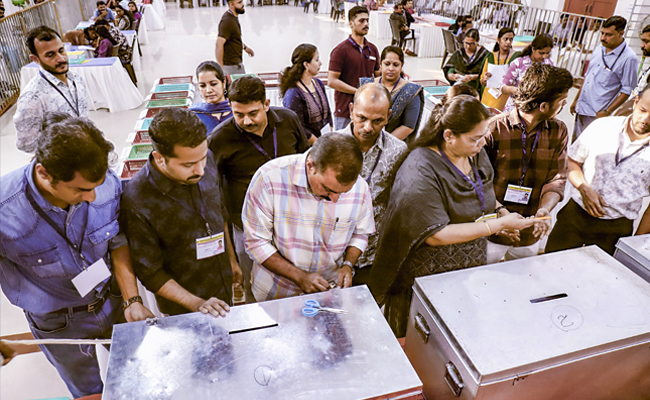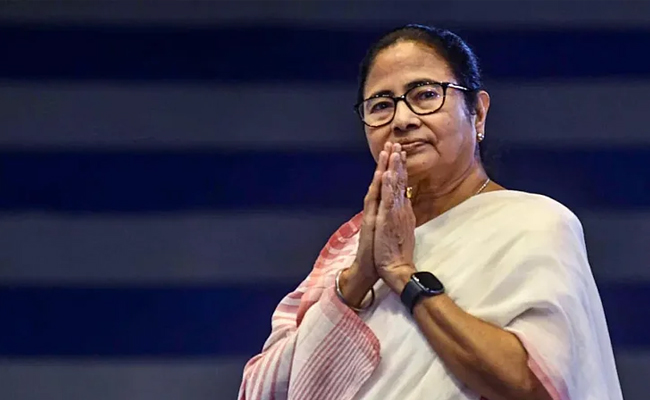Male (Maldives) (AP): Opposition candidate Mohamed Muiz won the Maldives presidential runoff on Saturday, securing more than 53 per cent of the vote, local media reported.
The election has turned into a virtual referendum on which regional power India or China will have the biggest influence in the Indian Ocean archipelago nation.
Mihaaru News reported that incumbent President Ibrahim Mohamed Solih had received 46 per cent of the vote and that Muiz had won by more than 18,000 votes. Official results were expected on Sunday.
"With today's result we have got the opportunity to build the country's future. The strength to ensure the freedom of Maldives," Muiz said in a statement after his victory. "It's time we put our differences aside and come together. We need to be a peaceful society."
Muiz also requested that Solih transfer former president Abdulla Yameen to house arrest from prison.
It was a surprise win for Muiz, who entered the fray as an underdog. He was named only as a fallback candidate closer to the nomination deadline after the Supreme Court prevented Yameen from running because he is serving a prison sentence for money laundering and corruption. Yameen's supporters say he's been jailed for political reasons.
"Today's result is a reflection of the patriotism of our people. A call on all our neighbours and bilateral partners to fully respect our independence and sovereignty," said Mohamed Shareef, a top official of Muiz's party.
He said it was also a mandate for Muiz to resurrect the economy and for Yameen's release.
Neither Muiz nor Solih got more than 50 per cent in the first round of voting earlier in September.
Solih, who was elected president in 2018, was battling allegations by Muiz that he had allowed India an unchecked presence in the country. Muiz's party, the People's National Congress, is viewed as heavily pro-China.
Solih has insisted that the Indian military's presence in the Maldives was only to build a dockyard under an agreement between the two governments and that his country's sovereignty won't be violated.
Muiz promised that if he won the presidency, he would remove Indian troops from the Maldives and balance the country's trade relations, which he said were heavily in India's favour.
Ahmed Shaheed, a former foreign minister of Maldives, termed the election verdict as a public revolt against the government's failure to meet economic and governance expectations rather than concerns over Indian influence.
"I don't think India was at all in the people's minds," Saheed said.
An engineer, Muiz had served as the housing minister for seven years. He was mayor of Male, the capital, when he was chosen to run for president.
Solih suffered a setback closer to the election when Mohamed Nasheed, a charismatic former president, broke away from his Maldivian Democratic Party and fielded his own candidate in the first round. He decided to remain neutral in the second round.
"Nasheed's departure took the motherboard away from the MDP," Shaheed said.
Yameen, leader of the People's National Congress, made the Maldives a part of China's Belt and Road initiative during his presidency from 2013 to 2018. The initiative is meant to build railroads, ports, and highways to expand trade and China's influence across Asia, Africa, and Europe.
Despite the rhetoric, Muiz is unlikely to change the foreign policy of affording an important place to India rather, opposition to Chinese projects is likely to lessen, evening power balances out, Shaheed said.
The Maldives is made up of 1,200 coral islands in the Indian Ocean located by the main shipping route between the East and the West.
"These five years have been the most peaceful and prosperous five years we've ever seen. We have had political peace, opposition candidates are not jailed every day," said Abdul Muhusin, who said he voted for Solih in the runoff on Saturday.
Another voter, Saeedh Hussein, said he chose Muiz because "I want the Indian military to leave Maldives.
"I don't believe the Maldivian military has any control. Only Muiz can change these things and make the Indian military leave Maldives," he said.
There were more than 2,82,000 eligible voters and turnout was 78 per cent an hour before the polling stations closed.
Let the Truth be known. If you read VB and like VB, please be a VB Supporter and Help us deliver the Truth to one and all.
Kochi (PTI): The prosecution had "miserably" failed to prove the conspiracy charge against Dileep in the sensational 2017 actress sexual assault case, a local court has observed while citing inconsistencies and lack of sufficient evidence against the Malayalam star.
The full judgement of Ernakulam District and Principal Sessions Court Judge Honey M Varghese was released late on Friday, and has revealed the judge also pointing out at unsustainable arguments put forth by the prosecution.
"The prosecution miserably failed to prove the conspiracy between accused No.1 (Pulsar Suni) and accused No.8 (Dileep) in executing the offence against the victim," the court held.
It examined in detail, the prosecution's allegation that Dileep had hired the prime accused to sexually assault the survivor and record visuals, including close-up footage of a gold ring she was wearing, to establish her identity.
On page 1130 of the judgment, under paragraph 703, the court framed the issue as whether the prosecution's contention that NS Sunil (Pulsar Suni) recorded visuals of the gold ring worn by the victim at the time of the occurrence, so as to clearly disclose her identity, was sustainable.
The prosecution contended Dileep and Suni had planned the recording so that the actress' identity would be unmistakable, with the video of the gold ring intended to convince Dileep that the visuals were genuine.
However, the court noted that this contention was not stated in the first charge sheet and was introduced only in the second one.
As part of this claim, a gold ring was seized after the victim produced it before the police.
The court observed that multiple statements of the victim were recorded from February 18, 2017, following the incident, and that she first raised allegations against Dileep only on June 3, 2017.
Even on that day, nothing was mentioned about filming of the ring as claimed by the prosecution, the court said.
The prosecution failed to explain why the victim did not disclose this fact at the earliest available opportunities.
It further noted that although the victim had viewed the sexual assault visuals twice, she did not mention any specific recording of the gold ring on those occasions, which remained unexplained.
The court also examined the approvers' statements.
One approver told the magistrate that Dileep had instructed Pulsar Suni to record the victim's wedding ring.
The court observed that no such wedding ring was available with her at that time.
During the trial, the approver changed his version, the court said.
The Special Public Prosecutor put a leading question to the approver on whether Dileep had instructed the recording of the ring, after which he deposed that the instruction was to record it to prove the victim's identity.
The court observed that the approver changed his account to corroborate the victim's evidence.
When the same question was put to another approver, he repeated the claim during the trial but admitted he had never stated this fact before the investigating officer.
The court noted that the second approver even went to the extent of claiming Dileep had instructed the execution of the crime as the victim's engagement was over.
This showed that the evidence of the second approver regarding the shooting of the ring was untrue, as her engagement had taken place after the crime.
The court further observed that the visuals themselves clearly revealed the victim's identity and that there was no need to capture images of the ring to establish identity.
In paragraph 887, the court examined the alleged motive behind the crime and noted that in the first charge sheet, the prosecution had claimed that accused persons 1 to 6 had kidnapped the victim with the common intention of capturing nude visuals to extort money by threatening to circulate them and there was no mention about Dileep's role in it.
The court also rejected the prosecution's claim that the accused had been planning the assault on Dileep's instructions since 2013, noting that the allegation was not supported by reliable evidence.
It similarly ruled out the claim that Suni attempted to sexually assault the victim in Goa in January 2017, stating that witness statements showed no such misconduct when he served as the driver of the vehicle used by the actress there.
The court also discussed various controversies that followed Dileep's arrest and the evidence relied upon by the prosecution, ultimately finding that the case had not been proved.
Pronouning its verdict on the sensational case on December 8, the court acquitted Dileep and three others.
Later, the court sentenced six accused, including the prime accused Suni, to 20 years' rigorous imprisonment.
The assault on the multilingual actress, after the accused allegedly forced their way into her car and held it under their control for two hours on February 17, 2017, had shocked Kerala.
Pulsar Suni sexually assaulted the actress and video recorded the act with the help of the other convicted persons in the moving car.

